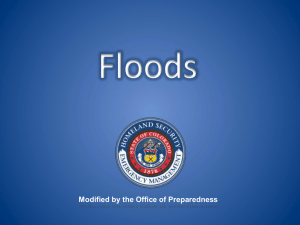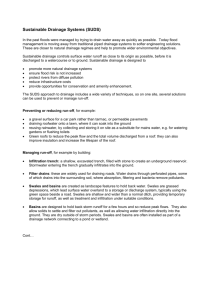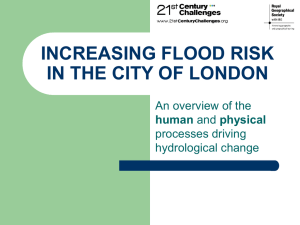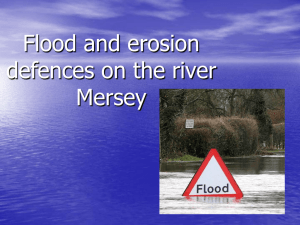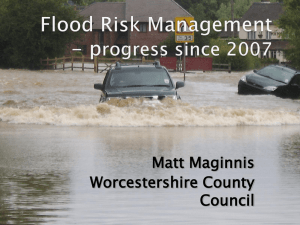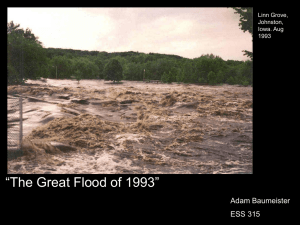2573 (2013) Roundhill Park, Moulton
advertisement
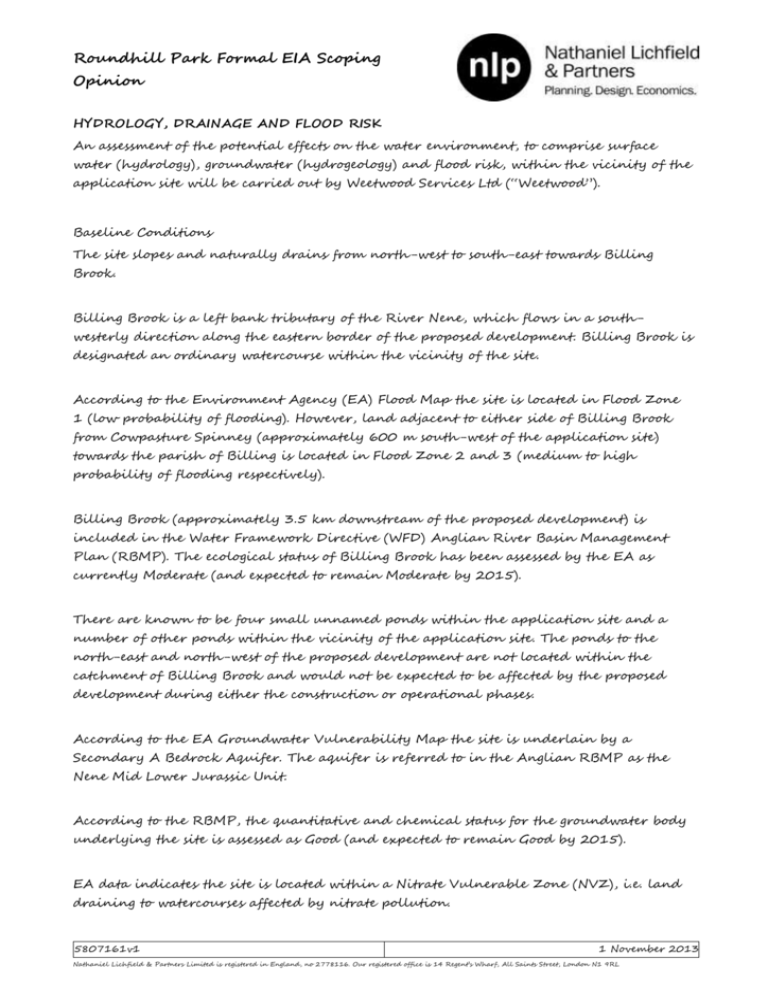
Roundhill Park Formal EIA Scoping Opinion HYDROLOGY, DRAINAGE AND FLOOD RISK An assessment of the potential effects on the water environment, to comprise surface water (hydrology), groundwater (hydrogeology) and flood risk, within the vicinity of the application site will be carried out by Weetwood Services Ltd (“Weetwood”). Baseline Conditions The site slopes and naturally drains from north-west to south-east towards Billing Brook. Billing Brook is a left bank tributary of the River Nene, which flows in a southwesterly direction along the eastern border of the proposed development. Billing Brook is designated an ordinary watercourse within the vicinity of the site. According to the Environment Agency (EA) Flood Map the site is located in Flood Zone 1 (low probability of flooding). However, land adjacent to either side of Billing Brook from Cowpasture Spinney (approximately 600 m south-west of the application site) towards the parish of Billing is located in Flood Zone 2 and 3 (medium to high probability of flooding respectively). Billing Brook (approximately 3.5 km downstream of the proposed development) is included in the Water Framework Directive (WFD) Anglian River Basin Management Plan (RBMP). The ecological status of Billing Brook has been assessed by the EA as currently Moderate (and expected to remain Moderate by 2015). There are known to be four small unnamed ponds within the application site and a number of other ponds within the vicinity of the application site. The ponds to the north-east and north-west of the proposed development are not located within the catchment of Billing Brook and would not be expected to be affected by the proposed development during either the construction or operational phases. According to the EA Groundwater Vulnerability Map the site is underlain by a Secondary A Bedrock Aquifer. The aquifer is referred to in the Anglian RBMP as the Nene Mid Lower Jurassic Unit. According to the RBMP, the quantitative and chemical status for the groundwater body underlying the site is assessed as Good (and expected to remain Good by 2015). EA data indicates the site is located within a Nitrate Vulnerable Zone (NVZ), i.e. land draining to watercourses affected by nitrate pollution. 5807161v1 1 November 2013 Nathaniel Lichfield & Partners Limited is registered in England, no 2778116. Our registered office is 14 Regent’s Wharf, All Saints Street, London N1 9RL According to the British Geological Survey (BGS) Groundwater Flooding Hazard Map the susceptibility to groundwater flooding varies across the site from moderate to significant. According to the Soilscapes maps produced by the National Soils Research Institute, the site is underlain by loamy and clayey soils. For the most part, the soils have impeded drainage. The exception is an area associated with loamy soils which are indicated to the south of the proposed development which are indicated to be free draining. The Kettering and Wellingborough Level 1 Strategic Flood Risk Assessment (SFRA) states surface water flooding has occurred within the vicinity of the application site along Holcot Lane in Sywell. Potential Effects Surface and sub-surface receptors potentially susceptible to environmental impact from flooding and drainage issues associated with the proposed development have been provisionally identified. This includes the assessment of construction and operational impacts. These are subject to confirmation as the EIA is undertaken and baseline conditions assessed. The ‘importance’ of each receptor will be designated using professional judgment and by reference to relevant guidance criteria, taking into account the quality and rarity of each receptor. In order to assess the impact significance of the proposed development on the identified receptors, the characteristics of each identified impact at the construction and operational stages have been considered. Identified impacts may be significant at the level of importance defined for the receptor, or at a lesser geographical scale. For example, limited impacts on a watercourse of County value might be assessed as being significant at a District level. Thus, the significance of effects will be determined from the importance of the receptor, the magnitude of the impact and, where appropriate, the likelihood of the effect occurring. The likely receptors and their importance/scale to be assessed are listed in Table 1 below. All receptors and receptor importance will be confirmed as the EIA is undertaken. Table 1: Development Receptors – Preliminary Identification and Importance 5807161v1 Error! Unknown document property name. Nathaniel Lichfield & Partners Limited is registered in England, no 2778116. Our registered office is 14 Regent’s Wharf, All Saints Street, London N1 9RL Receptor Nature of Impact Phase Receptor Importance Billing Brook Ponds Water quality Water Construction and Local to Operational District Construction and Local quality/flood risk Operational Aquifer Water quality Construction and Regional Operational Residents of Billing Flood risk (adjacent to Billing Brook) Construction and Very high Operational Note: To be confirmed during the EIA The potential unmitigated water environment effects considered significant to the application site include: Construction phase A reduction in surface and ground water quality due to contamination of runoff and/or changes to surface water drainage patterns and pathways from the surface to the underlying aquifer; Increased risk of flooding to people, plant and Holcot Lane due to an increase in runoff due to soil compaction. Operational phase An increase in surface water runoff (volume and rate) due to an increase in impermeable areas; leading to: o An increase in flow in Billing Brook and flood risk downstream; o An increase in volume of water in ponds; o A reduction in surface water runoff quality due to an increase in impermeable areas and in traffic volumes. Contaminated surface runoff could enter local water bodies; The large number of people visiting and employed at the proposed development will increase the risk of watercourses becoming blocked due to tipping of rubbish etc, leading to change in flood flow dynamics and an increase in downstream flood risk; Foul water from the developed site could pollute receptor water bodies; and The proposed development for the north-east portion of the application site is for naturalistic parkland and proposed woodland. As such, the impact to these ponds is considered to be minimal. 5807161v1 Error! Unknown document property name. Nathaniel Lichfield & Partners Limited is registered in England, no 2778116. Our registered office is 14 Regent’s Wharf, All Saints Street, London N1 9RL Cumulative Impacts The ES chapter will include a consideration of the cumulative impacts arising from the development of sites at: Roundhill Park (Phase 2) Overstone Leys Both sites drain in a south-easterly direction towards Billing Brook, the same drainage receptor as the application site. These could potentially impact upon the same environmental receptors (with the exception of ponds) as those identified for the application site. It is envisaged that these proposed developments will implement appropriate mitigation measures, including a surface water drainage system that restricts peak runoff rates to Greenfield rates (in accordance with national and local policy), and a foul water drainage strategy in consultation with Anglian Water and the EA, resulting in no significant cumulative effects. We do not propose including the following applications and proposals: Northampton Lane Land North of Boughton Road (DWH Site) Land South of Boughton Road (Hallam Land Site) Land North of Boughton Road (Salisbury Landscapes Site) Marsh Spinney Moulton Heights (Phase 1) Moulton Heights (Phase 2) These sites will not be included in the cumulative assessment because of their distance from the application site and also because these sites naturally drain (it is believed) towards the unnamed watercourse that flows into the Malton Arm of the Brampton Branch catchment, and are therefore located within a different catchment area to the application site. Method of Assessment of Impact The assessment will consider the potential effects on the water environment (both surface and sub-surface) and local hydrology. It will consider the capability of available water resources and supply networks to service the proposed development, in addition to an assessment of the location and capacity of the existing sewerage infrastructure including wastewater treatment works. 5807161v1 Error! Unknown document property name. Nathaniel Lichfield & Partners Limited is registered in England, no 2778116. Our registered office is 14 Regent’s Wharf, All Saints Street, London N1 9RL The assessment will be informed by a Flood Risk Assessment (FRA) based on the requirements of the National Planning Policy Framework and its Technical Guidance. The FRA will include: Details of historic flooding events; Identification of potential sources of flooding; An appraisal of the scope of possible measures to reduce the risk of flooding to and from the proposed development; A surface water drainage scheme based on sustainable drainage principles highlighting how sustainable drainage measures can be utilised to mitigate the impact of the proposed development on the water environment. Baseline information considering water quality, flooding and drainage, ground conditions, and topography will be based on a desktop study, site visits, stakeholder consultations, and relevant guidance and legislation. The methodology for carrying out baseline research includes the following: Review currently available data and information, including information on water resources (abstractions, designations etc) and on surface and sub-surface water quality, at and within the vicinity of the application site; Review international and national legislation and regulations relevant to the assessment of potential impacts to hydrology and drainage. In addition, review guidance and policy documents including, yet not exclusively, those published by the Department of Communities and Local Government, DEFRA, the EA, CIRIA and by relevant regional and local authorities including SFRA’s and Catchment Management Plans; Consult with the EA and Northampton County Council (NCC) (the Local Lead Flood Authority) regarding flood risk and drainage issues; Consult with NCC and the Borough Council of Wellingborough regarding highways flooding and flooding of ordinary watercourses; and Review the potential impact of the development on the quality of groundwater and amount of groundwater recharge, the British Geological Survey groundwater flooding maps, and the impact of the proposed development and associated SuDS scheme on the quality and quantity of surface water infiltration. Potential mitigation It is envisaged that the potential impacts on the water environment from the proposed development will be mitigated through a series of measures during both the construction and operational phases of the proposed development. Construction phase These may include: 5807161v1 Error! Unknown document property name. Nathaniel Lichfield & Partners Limited is registered in England, no 2778116. Our registered office is 14 Regent’s Wharf, All Saints Street, London N1 9RL Implementation of a Construction Environmental Management Plan; Best construction practices; and Sealed storage vessels to contain foul water from temporary staff welfare facilities and disposed of off-site. Operational phase These may include: Implementation of a surface water drainage scheme based on sustainable drainage principles; Implementation of a maintenance and management regime to prevent build up of debris and/or rubbish in water bodies on site; and Development of a foul water drainage strategy through consultation with Anglian Water and the EA to ensure foul water from the proposed development is sustainably managed. Consultation Consultation will be undertaken with the relevant statutory and non-statutory bodies, including: EA – regarding flood risk and drainage issues; NCC – regarding flood risk, drainage issues, highways flooding and flooding of ordinary watercourses; Borough Council of Wellingborough – as NCC; and Anglian Water – regarding water supply and foul water drainage. 5807161v1 Error! Unknown document property name. Nathaniel Lichfield & Partners Limited is registered in England, no 2778116. Our registered office is 14 Regent’s Wharf, All Saints Street, London N1 9RL

